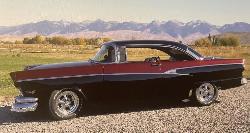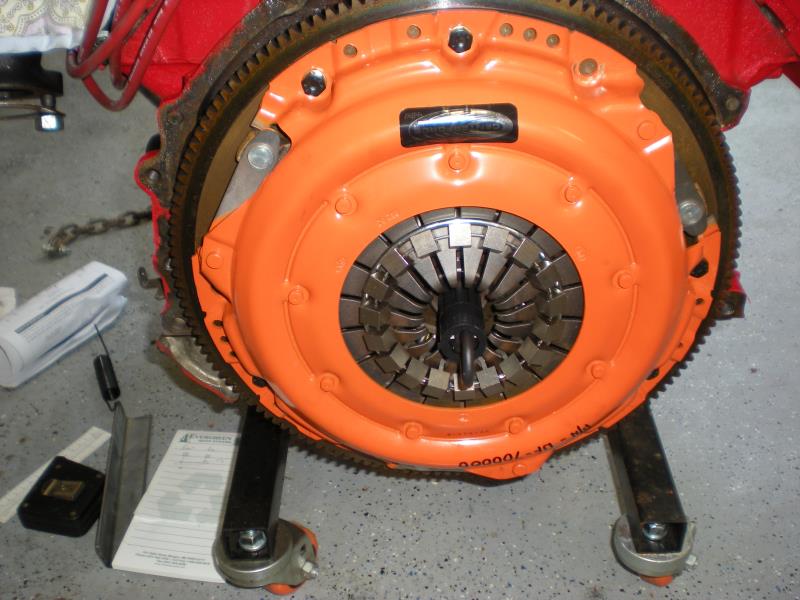|
Author
|
Message
|
|
speedpro56
|
|
|
Group: Forum Members
Last Active: Last Year
Posts: 1.3K,
Visits: 9.2K
|
I'll add I,ve been driving the direct stock setups since 1965, hundreds of thousands of miles with absolutely no problems on my more than I need ford and mercs.. Now on my wife's MG the hydraulic clutch setup has gone bad and has to be rebuilt, it started leaking and simply quit working. I'm for simple too.
-Gary Burnette-
|
|
|
|
|
NoShortcuts
|
|
|
Group: Forum Members
Last Active: 2 Years Ago
Posts: 1.4K,
Visits: 179.6K
|
THANKS to Mikhett for initially asking the question and for all the replies, opinions, and info Dobie Gillis, The Master Cylinder, Charlie, John, Ron, and Paul offered. Thanks to Billy, too, for proof reading everything! I'm sure that Mikhett appreciates all the insights as I do. This forum is GREAT because of the people who are willing to make the time to share their knowledge and experiences. 
NoShortcuts
a.k.a. Charlie Brown
near Syracuse, New York
|
|
|
|
|
Y block Billy
|
|
|
Group: Forum Members
Last Active: 7 Years Ago
Posts: 1.6K,
Visits: 5.2K
|
Being a bit younger I still catch on to these things, but I see the day coming sooner than I want to imagine!
 55 Vicky & customline 58 Rack Dump, 55 F350 yard truck, 57 F100 59 & 61 P 400's, 58 F100 custom cab, 69 F100, 79 F150, 82 F600 ramp truck, 90 mustang conv 7 up, 94 Mustang, Should I continue?
|
|
|
|
|
Rono
|
|
|
Group: Forum Members
Last Active: Last Year
Posts: 1.3K,
Visits: 80.0K
|
Ah, you are correct sir. The weights do their thing according to the laws of physics! How's that for CYA!! Rono
 Ron Lane, Meridian, ID Ron Lane, Meridian, ID
|
|
|
|
|
Y block Billy
|
|
|
Group: Forum Members
Last Active: 7 Years Ago
Posts: 1.6K,
Visits: 5.2K
|
Hi Ron, you have me baffled on that one, "as the weights spin they move inward" most weights with centrifical force move outwards?
 55 Vicky & customline 58 Rack Dump, 55 F350 yard truck, 57 F100 59 & 61 P 400's, 58 F100 custom cab, 69 F100, 79 F150, 82 F600 ramp truck, 90 mustang conv 7 up, 94 Mustang, Should I continue?
|
|
|
|
|
paul2748
|
|
|
Group: Forum Members
Last Active: Yesterday
Posts: 3.6K,
Visits: 497.7K
|
Under the "kiss" principal, go with the stock setup. As others said, its easy to adjust, simple in operation and really dependable.
Ditto on the centerforce clutches. I got one in my 312 powered 54 and I really like it.
54 Victoria 312; 48 Ford Conv 302, 56 Bird 312
Forever Ford
Midland Park, NJ
|
|
|
|
|
Rono
|
|
|
Group: Forum Members
Last Active: Last Year
Posts: 1.3K,
Visits: 80.0K
|
I'll add one more thing regarding clutch pedal effort while not directly related to hydraulic clutches. There are many aftermarket clutch and pressure plate options out there, but I have had a good experience with one in particular. I installed a "Centerforce" 11" clutch and pressure plate in my 56 Customline and just installed another on my new motor. Their installation instructions suggest removing the large clutch pedal spring located under the dash (in the 56 cars) as they are not needed which I did. I was amazed with the results. The "Centerforce" pressure plate uses a wire with counter weights on the diaphragm fingers. As the pressure plate spins, the weights move inward applying pressure to the diaphragm and reducing pedal pressure they say by as much as 40%. The photo shows their 11" dual friction clutch and pressure plate kit # DF-700000  Rono
 Ron Lane, Meridian, ID Ron Lane, Meridian, ID
|
|
|
|
|
Hoosier Hurricane
|
|
|
Group: Moderators
Last Active: 5 hours ago
Posts: 3.7K,
Visits: 323.1K
|
In most applications it doesn't matter, but in years past it was found that in drag racing with a hydraulic clutch, when "popping" the clutch and "speed shifting", the apply rate for the hydraulic system was slower than mechanical linkage, therefore clutch slippage was more pronounced. Drilling out passages and using larger diameter lines/hoses helped, but most serious racers didn't use hydraulics.
John - "The Hoosier Hurricane"

|
|
|
|
|
charliemccraney
|
|
|
Group: Moderators
Last Active: Yesterday
Posts: 6.1K,
Visits: 442.9K
|
The info I have indicates that '57 - '60 F100-950 and '61 - '62 F700-850 were equipped with the hydraulic clutch. I don't think those will all necessarily have y blocks, but the '57 - '60 parts will work on all trucks of that year model and the '61='62 parts will work on '61-'64 and I think through '66 still has the firewall stamped for the master cylinder. The same slave cylinder was used for all of those and even other manufacturers in the same era. The master cylinder, and possible pedal ratio is different. To answer your questions:' 1) I say yes, because there is less variability when the movement of the body and engine are eliminated and possibly even the friction from all of the pivot points is now gone. 2) I don't understand this one. I think the engagement feels more positive and assuring, if that makes any sense. 3) The pedal travel will be about the same because the ratio of pedal movement to clutch fork movement needs to remain the same for the same effort. A larger master cylinder will displace more fluid which will require less travel, but more effort. A smaller master cylinder will displace less fluid which requires more travel and less effort, BUT it may not move enough fluid to disengage the clutch.
Lawrenceville, GA
|
|
|
|
|
NoShortcuts
|
|
|
Group: Forum Members
Last Active: 2 Years Ago
Posts: 1.4K,
Visits: 179.6K
|
Interesting discussion. I'm illiterate regarding Ford pick-ups. I know NOTHING! I'm thinking the next step... What year Ford pick-up trucks with y-blocks had hydraulic actuated clutches? '54 - '64? Other questions... 1) Do hydraulic actuated clutches have a different 'feel' when actuated than a mechanical system? 2) Does the clutch seem to be 'engaged or disengaged' when compared to a mechanical system? -Charlie described it as being 'smoother operating'. 3) Is there less pedal travel associated with the clutch pedal of a hydraulic system than with a mechanically operated clutch discs? Thanks for helping the uninformed! 
NoShortcuts
a.k.a. Charlie Brown
near Syracuse, New York
|
|
|
|